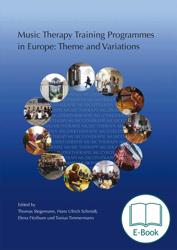This book provides an overview of all 119 European music therapy training programmes as well as a detailed portrait of 10 selected music therapy training courses from various countries, reflecting different music therapy backgrounds, approaches, phases of institutional developments, etc. It gives insights into the theoretical background, admission procedures, and the structure and content of each training programme, focusing especially on clinical training and internships, musical training, experiential learning and music therapy self-experience, as well as the evaluation procedures concerning the quality of teaching.
The aim of this book was not only to provide an overview of the current situation of music therapy training programmes in Europe, but to also give detailed insights into the structure and the content of music therapy training courses in different European countries. Thus, it literally draws a map of all 119 European music therapy training programmes, including a detailed table in the appendix of the book with facts from tuition fees to internet links of every training course.
The detailed portrait of ten selected music therapy training programmes encompasses the following: Vienna, Austria, Leuven, Belgium, Aalborg, Denmark, Paris, France, Augsburg, Germany, Ferrara, Italy, Liepaja, Latvia, Katowice, Poland, Barcelona, Spain, and Roehampton, United Kingdom.
The rationale for the selection was to portray degree programmes from various countries, covering the three European regions according to EMTC’s organisational structure: North, Middle and South of Europe. In addition, we strived to include different music therapy backgrounds, approaches, phases of institutional developments, different healthcare systems, different status of legal recognition of music therapy, and so on.
Following a common framework, each chapter gives insights into the theoretical background, admission procedures, and the structure and content of the particular training programme, focusing especially on clinical training and internships, musical training, experiential learning and music therapy self-experience, as well as the evaluation procedures concerning the quality of teaching.
The last part of the book then offers a conclusion and an outlook by the editors, summing up and commenting on the synopsis of curricula depicted in the previous chapters.
„Overall this text is an excellent and timely resource as music therapy continues to develope not only as an art but also as a science, and the foundation that clinicians and researchers work from is created and informed by the educational process.“
Von: Amy Clements-Cortes
In: Music & Medicine, 2017, Volume 9, Issue 2, pp. 145-146.
Stegemann, Thomas, Univ.-Prof. Dr. med. Dr. sc. mus. (*1972)
Thomas Stegemann studied guitar (Los Angeles, USA), medicine, and music therapy. He is a child and adolescent psychiatrist, a licensed music therapist, and a family therapist. Since 2011 he serves as Professor of Music Therapy and Head of the Department of Music Therapy at the University of Music and Performing Arts in Vienna, Austria. Main research areas: Music therapy and neurobiology, receptive music therapy with children and adolescents, music therapy with families
Schmidt, Hans Ulrich, Prof. Dr. (*1958)
Study of music pedagogics (Hamburg), music therapy (Hamburg, Vienna), medicine (Hamburg). Doctor for psychosomatic medicine at Hamburg University Hospital. Director of MA programme and Research Centre for Music and Health, Leopold Mozart-Centre, University of Augsburg. Private therapeutical practice in Hamburg. Member of scientific committee of dmtg. Publishing: Books, articles.
Fitzthum, Elena, Dr. sc. mus. (*1954)
Music therapist, psychotherapist and supervisor with over 30 years of experience in a variety of clinical settings. Elena Fitzhum is chair of the Viennese Institute of Music Therapy (WIM) and co-editor of WIM´s book series Viennese Contributions to Music Therapy and member of the EMTC Board. She is a lecturer at the University of Music and Performing Arts Vienna and at the Zurich University of the Arts. Her theoretical work is focussed on the history and development of music therapy.
Timmermann, Tonius, Prof. Dr. (*1950)
Study of paedagogy in Münster and music therapy in Vienna. Trainings in breath therapy and systemic constellations. Clinical practice: psychiatry, psychotherapy and psychosomatics. Research and graduation (Dr.rer.biol.hum.) at the University of Ulm, Department for Psychotherapy. Professor at the University of Augsburg. Head of the Master training in Music Therapy and the Research Center for Music and Health (2003 – 2015). Private therapeutical practice in Munich. Publishing: books, articles and music.


 Sample
Sample